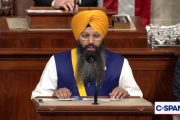
Senator Sherrod Brown (D-Ohio) sent out an e-mail blast to constituents on October 14, in which he described President Obama’s landmark Trans-Pacific Partnership (TPP) initiative as “an enormous giveaway to huge corporations and CEOs and a massive sellout of American workers and jobs.”
From Senator Brown’s harsh criticism one might think he was condemning a radical Republican president. Instead, this further highlights the divide between President Obama and members of his own party in Congress over the TPP.
Senator Brown’s e-mail comes only five days after he sent a letter to President Obama, posted as a press release on his Senate website, rebuking the secretive handling of the TPP agreement.
“Access to the text has been inadequate throughout the TPP negotiations,” Senator Brown wrote. “In addition, despite repeated requests, congressional staff with the necessary security clearance are still prohibited from seeing the text on their own.” Senator Brown emphatically continued, “Announcing your intent to sign the agreement before we are able to read TPP calls into question just how consultative and deliberative the legislative process will be.” [Emphasis added].
Brown followed up with a less than enthusiastic expectation about the final outcome of the TPP. “You have called the TPP the ‘most progressive, high-standard trade deal ever crafted.’ While I am not sure I will ultimately agree with that statement, I am waiting to make a decision until I have reviewed the text.”
This is not the first time Brown has vocalized his disagreement to the president over the TPP.
On June 13, 2012, Senator Brown issued a statement criticizing the Obama administration for the lack of oversight and transparency on the TPP:
After more than a decade of broken promises from NAFTA, CAFTA, and normalized trade relations with China, we can now add a credibility deficit to the trade deficits we’ve seen. The leaked documents surfacing today only underscore the secrecy surrounding TPP negotiations and confirm worst suspicions about the direction trade negotiations are heading. It’s telling that it is easier for the CEO of a major corporation to access information about the negotiations than the American people’s elected representatives.
The negotiations must involve more transparency and bring more voices to the table.
On April 16, 2015, during the Senate Finance Committee’s hearing about Congress and U.S. tariff policy relative to TPP, Senator Brown spoke out against the short notice of the hearing, noting that previous “trade” agreements received extensive vetting from lawmakers. “Today we’re meeting in a hearing that was noticed 12 hours before it began on a bill we haven’t seen with witnesses, I assume, who know more than we do, and frankly, will never tell us,” Brown said. “We can’t fast track fast-track; that’s a complete abdication of our responsibilities.”
Senator Brown ultimately voted against Trade Promotion Authority (TPA) “fast-track” on June 23, 2015.
In addition to Brown, Senator Rand Paul (R-Ky.) has also called for the immediate release of the TPP text.
In an interview with Breitbart News, published online on June 6, 2015, Senator Paul said that “absolutely” President Obama should immediately disclose the text of the TPP. “It kind of boggles the mind,” Paul told Breitbart. “Who’s in charge of the administration that decides to keep a trade treaty secret? To keep it classified makes no sense at all,” Paul added.
U.S. Trade Representative Michael Froman announced earlier this month that the United States and 11 other Pacific Rim nations that comprise the TPP had reached a final agreement. According to the New York Times, on October 5, 2015, the TPP’s “full 30-chapter text will not be available for perhaps a month.” However, a vote on TPP is not expected until the 2016 lame-duck session — after the election.





